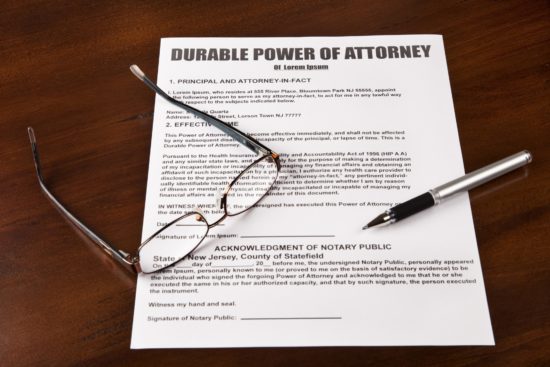You are vulnerable to a particularly scary type of abuse that can deprive you of control over your home, assets and personal freedom — unless you file an often overlooked and misunderstood legal form called a power of attorney.
 The power-of-attorney form gives someone else the ability to act on your behalf.
The power-of-attorney form gives someone else the ability to act on your behalf.
While it’s most commonly associated with situations leaving a person mentally or physically incapacitated long term, there are also shorter-term scenarios in which you might need someone to sign documents or make decisions for you — like when you’re out of the country or hospitalized.
Although living wills often contain power-of-attorney clauses, filing an additional form that specifically focuses on power of attorney gives you more control over who can act on your behalf.
It Happened in Las Vegas
Setting up a carefully worded power of attorney today, while you are healthy, can protect you from the kind of swindlers who duped 150 retirees out of all their assets.
A Las Vegas grand jury indicted the perpetrators in March, but the stolen funds have already been spent and are apparently unrecoverable.
According to this indictment, the four employees of A Private Professional Guardian LLC fraudulently used their status as a legal guardian to obtain control of the victims’ assets and decisionmaking ability.
The criminals liquidated everything the victims owned and had the seniors committed to facilities that they didn’t want to be in. Many of those who lost money actually had written wills that somehow didn’t protect them from the racketeers.
With Or Without a Will
So if you have retirement plans in which you’ve designated beneficiaries but have yet to write a will, the power of attorney form might be a good interim step because it doesn’t require you to take an inventory of your assets nor make any decisions about who should get what.
On the other hand, you might want to file the power of attorney form at the same time as a will to rein in court fees.
You can file the power of attorney without writing a will, but the form goes to the same court — it’s called probate it’s often a department within a jurisdiction’s family court.
Take It to Court
Without filing the form to a court, it can be difficult to enforce and might not help you accomplish your goals. While the court filing fee might put you out a couple of Franklins, it will seem like a trifle compared to what you stand to lose if a third party swoops in and files a power of attorney in order to seize control of your assets.
If you want to avoid legal fees at all costs and are willing to only address power-of-attorney at the end of your life, you could fill out an Advanced Directive form from the National Hospice and Palliative Care Organization.
The form indicates that you can file a copy of it to the registry maintained by your state’s attorney general, but the links aren’t necessarily up to date, so click here to the correct location in Google search results.
Cheaper Than Lawyers
About eight websites offer starter versions of power-of-attorney forms for free but most eventually charge money for premium services — on some sites, this includes custom answers to questions fielded by attorneys.
Many of the sites have a free initial trial period for limited access to a full buffet of legal forms and then begin charging monthly rates. Others only let you look at the forms for free but charge money when you want to customize and print them.
If you expect you might need to update and resubmit any of these forms or if you have other legal needs — like owning a business — the subscription versions of all these sites are much cheaper than what it costs to hire a lawyer (depending on the location and experience level, most attorneys bill between $200 to $1,000 per hour apiece).
Where to Get Forms
Here are all the legal forms sites that have power of attorney forms:
- eForms has a free seven-day trial with unlimited access to all legal forms; after that, the site charges $45 for a single document or $120 annually for a subscription.
- FormSwift charges $1.95 for a seven-day trial of its site site offering 500 different legal and tax forms; the paid version goes for $39.95 a month.
- Loio offers a free seven-day trial with full access to its platform; afterward, users can purchase individual templates for $29.95 each, subscribe for $29.95 a month, or pay $119.40 annually (about $9.95 a month equivalent) for unlimited document creation, e-signing, and storage.
- LawDepot offers a free one-week trial letting you access all documents; thereafter, it sells individual documents in basic form for $7.50 to $39 apiece, which includes full access to it for 14 days; a monthly subscription version costs $33.
- LawFormsUSA sells you a one-time download for $20, and offers a premium service for $33 a month.
- LegalNature offers a free seven-day trial, and then sells subscriptions to individuals for $38.95 a month or $299 annually, while charging businesses $58.95 monthly and $499 annually.
- LegalZoom offers three tiers of pricing for each type of legal form, with power-of-attorney starting at $35 and other forms having different starting prices based on their complexity.
- Nolo Press sells annual subscriptions for $20 to $40 for access to a power of attorney form specific to your state and the specific subset of powers you want to grant to your chosen agent(s).
- RocketLawyer has a free seven-day trial, which includes your choice of three forms along with one bonus question queued to an attorney. After that, there’s a flat fee of $39 monthly.
Five Kinds of Powers of Attorney
Lawyers actually describe five different categories of powers of attorney, based on the time and scope of the authority being granted. The person creating the authority is known as the principal, while the one who receives that authority is known as an agent, and you can also opt to have two co-agents or set up one agent as primary and another as contingent or backup. Here are the five:
- A non-durable power of attorney only lasts for a set period of time, typically for a particular transaction. A durable power of attorney is typically more encompassing, involving authority over more than one area or for an indefinite period of time.
- A special or limited power of attorney is intended for a one-time transaction or situation in which the principal is unable to act on his or her own behalf. For instance, you might grant someone the authority to sell your car for you, manage investments on your behalf, sign loan papers for you, or address a specific financial risk (like preventing another party from attempting to become your guardian).
- A medical power of attorney gives the agents the ability to take control of the healthcare decisions of somone who is incapacitated or otherwise unable to do so. This typically requires the consent of a presiding physician to take effect and then allows the agent to authorize all medical decisions.
- A springing power of attorney becomes effective at a future date when a specific event occurs, and can be durable or non-durable. It might include any number of types of decision making the principal wishes to assign to an agent. This is the type of power of attorney you might choose to prevent an abusive guardian from seizing control of your situation especially if you identify this as your goal in the section discussing when and how the power of attorney becomes effective.
While the difference between the five might seem like semantics to the layperson, apparently the terms have meaning in court and populate accordingly on whichever form wizard you might choose to put yours together. Ultimately, this is something that you might describe as better safe than sorry — otherwise, it’s possible you might not know you needed it until it’s too late.
Readers, have you thought about creating an estate plan and if so, what have you done in the way of preparation?
Jackie Cohen is an award winning financial journalist turned turned financial advisor obsessed with climate change risk, data and business. Jackie holds a B.A. Degree from Macalester College and an M.A. in English from Claremont Graduate University.




Comments